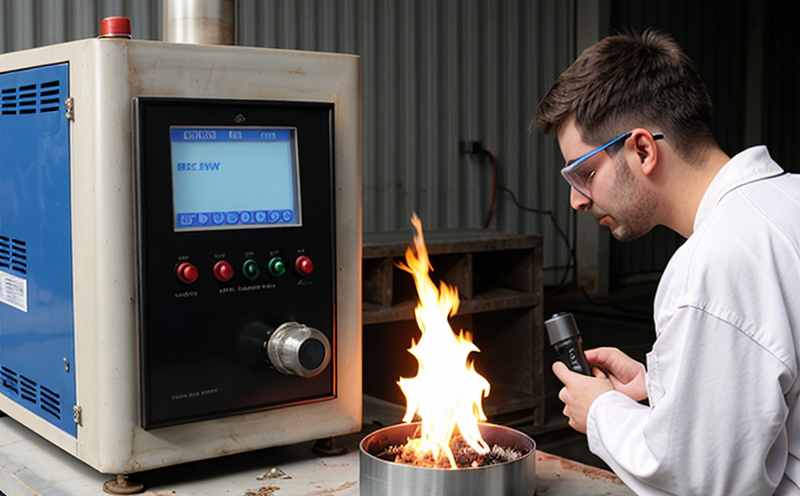ISO 14971 Heat Transfer Efficiency Testing
The ISO 14971 standard is a comprehensive framework designed to evaluate heat transfer efficiency in various HVAC (Heating, Ventilation, and Air Conditioning) equipment. This service focuses on the testing procedures outlined within this international standard to ensure that equipment meets stringent performance requirements.
Heat transfer efficiency is critical for the optimal functioning of HVAC systems, as it directly impacts energy consumption and operational costs. The test procedure defined in ISO 14971 involves several key steps, including setting up a controlled environment, preparing the specimen, and conducting specific tests to measure heat transfer performance.
During testing, specimens are exposed to controlled conditions that mimic real-world operating environments. This ensures that the results obtained during the test accurately reflect how the equipment will perform in actual use. The apparatus used for this purpose includes a calorimeter, temperature sensors, and other precision instruments designed to measure heat transfer rates precisely.
Acceptance criteria under ISO 14971 are rigorous, ensuring that only high-quality HVAC equipment meets these standards. Compliance with these criteria is essential for manufacturers looking to enhance their market competitiveness by demonstrating superior product performance. The testing process not only helps in identifying potential issues early on but also provides valuable insights into improving design and manufacturing processes.
The importance of this service cannot be overstated, especially given the increasing focus on sustainability and energy efficiency across industries. By adhering to ISO 14971 standards, manufacturers can ensure their products comply with international regulations while also gaining a competitive edge in the global market.
Manufacturers who invest in this testing process benefit from improved product quality, enhanced customer satisfaction, and reduced warranty claims due to premature failures or suboptimal performance. Additionally, successful completion of these tests opens doors for broader market access as many regulatory bodies around the world recognize and accept results derived from ISO 14971.
In summary, ISO 14971 heat transfer efficiency testing plays a vital role in ensuring HVAC equipment meets stringent performance standards. It provides manufacturers with crucial data needed to improve product design, optimize production processes, and ultimately deliver superior quality products that meet both regulatory requirements and customer expectations.
Why It Matters
The significance of ISO 14971 heat transfer efficiency testing extends beyond mere compliance; it is a cornerstone in driving innovation within the HVAC industry. By rigorously assessing how efficiently different components exchange thermal energy, this standard helps identify areas where improvements can be made to enhance overall system performance.
- Increased Energy Efficiency: One of the primary benefits of adhering to ISO 14971 is achieving higher levels of energy efficiency. Efficient heat transfer means less wasted energy, which translates into lower operating costs and reduced environmental impact.
- Better Product Quality: Through precise measurements and stringent criteria, this testing ensures that only high-quality HVAC equipment reaches the market. This leads to improved customer satisfaction and trust in brand reputation.
- Safety Compliance: Ensuring compliance with ISO 14971 helps prevent accidents related to overheating or malfunctioning components, thereby enhancing safety standards across installations.
In essence, ISO 14971 heat transfer efficiency testing is not just about meeting regulatory requirements; it sets a benchmark for excellence in HVAC equipment design and manufacturing. It encourages continuous improvement by providing detailed insights into performance metrics that drive better decision-making throughout the product lifecycle.
International Acceptance and Recognition
The widespread adoption of ISO 14971 across various countries underscores its relevance and importance in the HVAC industry. Many national standards bodies have incorporated elements from this international standard into their own guidelines, reflecting a global consensus on best practices for heat transfer efficiency testing.
Regulatory agencies worldwide recognize certifications based on ISO 14971 as proof of adherence to recognized quality benchmarks. This recognition facilitates smoother compliance processes and reduces barriers to entry into markets that have stringent requirements regarding equipment performance.
In addition to regulatory bodies, organizations such as ASHRAE (American Society of Heating, Refrigerating and Air-Conditioning Engineers) also recommend following ISO 14971 when evaluating HVAC systems. The endorsement by reputable institutions lends credibility to the methodology employed in these tests, further emphasizing its value within the sector.
For manufacturers aiming to expand their presence internationally, obtaining certifications based on ISO 14971 can significantly streamline compliance efforts and open up opportunities for business growth. It demonstrates a commitment to maintaining high standards of quality and reliability, which is increasingly becoming a prerequisite in today’s competitive landscape.
Use Cases and Application Examples
- Testing Condensers: This involves simulating real-world operating conditions to evaluate the heat exchange capability between refrigerant and ambient air. The results help manufacturers optimize condenser designs for better performance.
- Evaluating Heat Exchangers: Testing these components ensures they operate efficiently under various load conditions, which is crucial for maintaining optimal cooling or heating levels in HVAC systems.
- Assessing Air Handlers: By subjecting air handlers to controlled thermal environments, this test assesses their ability to manage airflow while transferring heat effectively. This information aids in selecting appropriate equipment based on specific application needs.
- Inspection of Refrigeration Systems: Regular checks using ISO 14971 guidelines ensure that refrigeration systems continue functioning optimally over time, preventing potential breakdowns and associated downtime costs.
The versatility of ISO 14971 makes it applicable not only to new product development but also in routine maintenance procedures. For instance, periodic testing can identify early signs of degradation or inefficiency that might otherwise go unnoticed until significant damage occurs. Early detection allows for timely intervention, preserving the integrity and longevity of HVAC installations.





